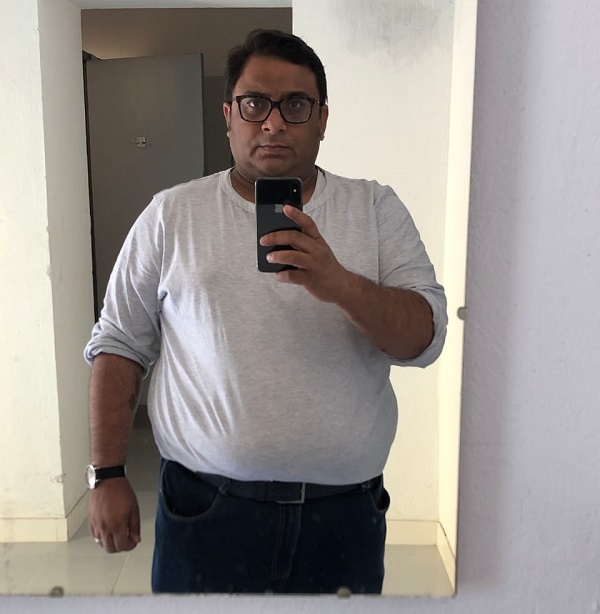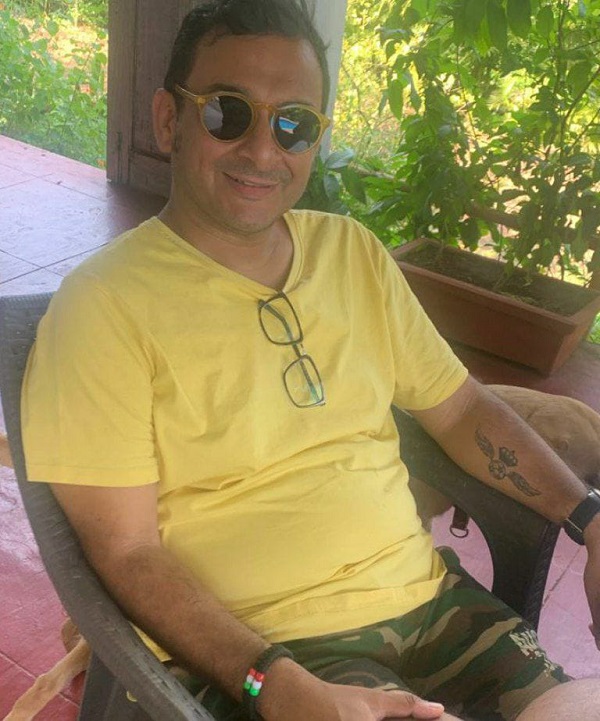
Deepto Roy recounts how he managed to achieve an almost impossible personal goal last year. In spite of the pandemic, he managed to lose 28 kilos in a year and go on to maintain that loss.
Why did you decide to lose weight?
I have always struggled with weight. I guess I had some form of genetic predisposition to put on weight. But I was very active all the way through college so that helped to keep the weight off. Once I joined work, things changed. My lifestyle became more sedentary and bad hours combined with bad food made me rapidly put on weight. I have struggled with obesity for almost 13-14 years. I have tried various things, diets, exercise processes. I have lost weight but have always tended to gain it back.

When I crossed my 39th birthday, on 29 September 2019, I decided that I was running out of time to do something about my weight, and once I cross 40, it would be that much harder. There were also a couple of incidents with friends of mine, in their mid-forties, suffering from significant heart issues. That was a motivator as well.
What is your biggest motivation? Has that changed over time?
For me it was simply to become as healthy as I could, and that involved losing a fair bit of weight. I wanted to become far leaner by the time I was 40. As I lost the weight, I saw that I could be far more active, and engage in many more activities than I could before. The best feeling was the ability to fit into off the shelf clothing, which I had not be able to do for years. The motivation effectively remains the same, which is to be healthy, but the ancillary gains, in terms of being able to lead a more active life, is also a motivation.
Do you need support from your family and friends or are you self-driven?
I did most of the planning myself. I spent a fair amount of time studying the science. But without the support of my family, who had to make several lifestyle changes for me, this would not have been possible. Friends have been extremely encouraging, particularly in the initial stages, when I would be a buzzkill at parties. The amount of support I have received for my weight loss is extraordinary.
My wife and my parents were my biggest supporters. .
How did you go about losing weight?
I knew that the only thing that could work for me was something drastic. Between October to December 2019, I cut down all carbs, sugar and alcohol from my diet. I cut down on food portions as well massively and significantly increased my protein intake. Over time I returned to more normal eating cycles, but I still exclude carbohydrates and sugars as much as possible from my food. I hired a personal trainer and tried to get fitter and work out more. It was impossible at first, but got easier as I spent more time working out. I also followed a program called C210K, which is an NHS approved running program, which helps you start from scratch and build up to a 10 kilometre run. I found that by following each day’s workout rigorously, I could build my stamina significantly.
Finally, I obsess about measurements. I measure the calories of every meal I eat (I use the app Myfitnesspal) as well as all my steps and workout sessions. For this I rely on a fitness band. I found that being obsessed about my calorie intake was vital for me.
Anything that did not work for you such as diets or exercise routines?
6 meals a day and small portions did not work for me. It just made me hungrier. Similarly, liquid meal replacements (protein shakes) did not work, again made me hungrier.
What has been your biggest challenge?
The initial period of the lockdown, when it was not possible to work-out and I ended up eating a fair bit of junk, was challenging. In the end I had to reset my entire routine and find a different way of controlling food and getting exercise in.
The first three months, where I ate very little, was tough, as I was completely giving up sugars and carbs. I consoled myself that it was only temporary.
How much weight have you lost in all? What is your goal?
I have lost 28 kgs since October 2019!

I need to lose 7 kgs more, so that I am 70 kgs. It’s still a little high for my height, but I think it is more sustainable.
How do you plan to maintain your current weight?
- I still am strict about my diet. I try to monitor calories during the week and avoid carbs and sugars. While I allow myself other foods in the weekends, I try to ensure that these deviations are limited.
- I try and do some form of physical exercise everyday and ensure that I remain physically active.
- Once in a while (once in two weeks) I eat only one meal a day. This helps in cutting calories effectively.
What advice would you give to other people who need to lose weight?
While everyone has a different way of approaching diets in particular, I think it’s important to understand the modern science on dieting and nutrition. The two fundamental principles of losing weight for me are:
- To maintain a calorific deficit of approximately 500 calories a day and around 2500 -3000 calories a week. This is easy to monitor and can be a very good benchmark. For example, if you have had a bad diet day where you’ve overeaten, the simplest fix is to cut down calories the next day.
- The body finds it easier to burn carbs and sugars to generate energy and then stores the rest as fat. It’s important to break this cycle to see actual weight loss.
- Ultimately it is all about the food we eat.Exercise improves health otherwise, burns calories and also makes one feel good. But exercise is not enough to lose weight; it must be combined with a diet.
- Walking is a massively underrated exercise. An hour and a half of walking at a brisk pace burns a significant number of calories. And what’s more, it doesn’t kill you physically or expose you to injuries.
- Finally, measure. Results that reflect in actual numbers is the absolute motivator.
For someone looking at relatively non-conventional ways to lose weight and get fitter, I highly recommend Tim Ferriss’ “The 4-Hour Body”. The anecdotes are annoying but it breaks things into little packages, and make them seem achievable.
PatientsEngage Note: Based on the research, you will likely lose weight if you follow the 4-hour body diet. Quite a few people say it worked for them. However, it's not sustainable long-term, since you're likely to get bored eating the same foods again and again. And you will need to watch out for nutritional deficiencies since you omit entire categories of food from your meals. Also the advice on sleep is problematic.





